Let’s start by asking if you are moving to Kindergarten. You can not even begin to imagine the HUGE blessing you have been given by teaching five and six-year-old children next year. So here are Tips When Moving from Upper Elementary to Kindergarten.
Tips When Moving from Upper Elementary to Kindergarten
First, you may choose to be teaching Kindergarten next year or you may have been “voluntold.” Regardless, the amount of love that will be growing in your classroom over the next 180 days will shock you.
Next, I am so excited for you and the journey you are about to embark on. Of course, I am more passionate about Kindergarten than any other grade, and I want you to have that same passion. Once you take in these moving to Kindergarten tips, you will be more prepared and more ready.
My Upper-Grade Experience
Now, it isn’t a secret that I was a 5th-grade teacher for one year. You can read more about that journey here.
I often get asked if it was really hard or really different. Some people can’t see an upper elementary teacher TEACHING lower grades or vice versa. The truth is… a teacher is a teacher.
If you decide to be the BEST teacher you can be for your students, you will be. Make that decision now. Then, let me see if I can lend you, upper-grade teachers, a hand when it comes to figuring out more about the world of Kindergarten. Finally, let’s talk about all those Tips When Moving from Upper Elementary to Kindergarten
Moving to Kindergarten Tips About The Kids
-Kids are kids. First, their personalities pretty much stay the same. The way kids act in 5th grade is VERY similar to how they will act in kindergarten. Potty jokes are timeless and remain funny forever. And the word underwear remains a powerful tool to silence a room. But seriously, their bodies get bigger WAY before their minds do. Don’t worry about the kids.
-Younger kids can sit/listen/learn for less time. 5 years old equals about a 5-minute attention span on average. Keep that number in mind when selecting books, activities, or giving assignments. Try to start an activity with a song or a chance to wiggle. Teach, then wiggle. Read, then wiggle. Sometimes just wiggle to wiggle. Do not expect more than 5 minutes on the first day of school. Watch their eyes and their faces. Now, when they have lost interest, stop.
-Little kids think you hang the moon and create the stars. Let them think this. Play into it. They will do anything for you. You will need them to be on your side and work with you as much as possible.
-Next, little kids also think you live at school. If they see you in public it shocks them. They most likely can not find words to say to you because, well, YOU SHOULD BE AT SCHOOL.
-Find the difference between a student problem and a parent problem. NEVER hold a student responsible for a parent’s problem. They have no control over how many pencils they have or if their parent forgot to send in a transportation note. Smile to reassure them and give them a hug. Then problem solve the situation with them or for them, depending on the need. The list of responsibilities for a 5-year-old is not a lot. That is a good thing.
-Listen to them. Take time to just listen to them. It will tell you everything you need to know about them and more. Ask open-ended questions. Make sure they know that YOU think they hang the moon. This will make sure they are ready to learn.
-When they make a mistake, and they are going to, try to find humor in it. They are probably so scared to tell you their mistake or think you will be mad. Mistakes are evidence of trying. And trying is what matters. We don’t have our jobs because children are perfect. We have our jobs because of their imperfections.
-The first kid who has to go to the bathroom sets off a chain reaction. Expect it. Also, going to the restroom is never quick, simple, and easy. It is something that must be taught and practiced.
-The same about the bathroom holds true for a band-aid. If you pass out one, you will go through the whole box in under a minute. Don’t carry fun band-aids ever. They are the kiss of death. You are welcome for that tip… no one told me.
-They may not remember what their jacket or lunch box looks like or where they left it. Keep a black Sharpie handy for the first two weeks of school to constantly write their names on everything they bring in. It is just smart.
Moving to Kindergarten Tips About The Curriculum
-First, we have a real curriculum in Kindergarten. We do real learning here. You can see my curriculum map here if this helps you. Ask about yours and use it. I also have a lesson plan template you can grab and edit and use. YEP… 100% free.
-Most likely you will have snack time, but probably not nap. Think ahead and know what you can and can’t do for those who do not bring a snack. Remember this is a parent problem, not a student problem.
-You are not just babysitting, but others will think so. Who cares? I tell people, I will gladly babysit your child for 8 hours a day… just bring them here. Once they are here, I can teach them. It works for me.
–You will teach just as many social skills as educational content if not more. Many times you have to teach the social BEFORE you can even attempt the content. Teachers like me like to get to the content, and sometimes we rush the social. I am calling myself out here.
-If you make learning fun, your students will want to be in your classroom learning. That is the real trick. Students who want to be in your classroom seldom act up.
–Assume your students know nothing. Some may be able to write their own name and many can not. Very few students can use both upper and lowercase letters in their names correctly. Start the year assuming the kids in your classroom have never had a teacher ever. You will be right 50% of the time and pleasantly surprised at the other 50%. Low expectations rarely disappoint.
–Lessons take minutes, not hours or days. When your student has a longer attention span, the lesson can last longer.
-Next, you will cover the same standard MANY times a year. Not once and not twice. Over and over again. Your students will now ALL learn the rhyme the first three times you have a lesson about it. But they will over time. Forget about concentrating on one long standard over a month. Short and often is your new motto.
–You will teach more life skills than you can imagine… to your students. Examples include waiting your turn, buttoning pants, putting on a jacket, and even tying shoes.
Moving to Kindergarten Tips About Parents
–You will teach more life skills than you can imagine… to your student’s parents. They most likely have not been trained on separating lunch money from book fair money or checking their child’s agenda every day. This is a huge moving-to Kindergarten tip.
-Parents might even think you can respond to an email in the middle of the day. I usually have at least one parent who calls the school to talk to me during the school day only to discover… you guessed it... I am teaching and can’t come to the phone.
– Be patient with the parents. They are honestly trying and they truly care about their student, which is always a good thing.
-And remember those parents you got in the upper grades who knew the rules and policies? Most likely the kindergarten teacher helped train them. Now it is your turn to share the love.
-
Product on saleBack to School BundleOriginal price was: $29.00.$20.30Current price is: $20.30.
-
Product on saleClassroom Decor Pack Bundle Black PrimaryOriginal price was: $29.00.$14.50Current price is: $14.50.
-
Classroom Rules and School Rules$5.00
The Teacher: {you}
–Don’t judge Kindergarten by the first month. The first month of school is the longest. I am not going to lie… it is hard. Sometimes impossibly hard. THIS IS NOT YOU nor a reflection of you. It is true for every K teacher I know. You will get through it. And the second month of school will hit… it all gets easier. I always think to myself, if I think it is hard and I have done this for how many years, I wonder how my students are feeling. It is hard on them too!
–Try to be kind, but consistent. Even if they ask you the same thing over and over again, be consistent. A great example is your daily schedule. When you are consistent with your schedule, they don’t stress or worry about what is next… they know what is coming.
–Tell them specifically why as needed. Older kids already know what they are doing is wrong, and this is not always true for younger students. I like to tell them the WHY so they really understand. “We wash our hands before we eat to get the germs off before we touch our food. This helps you to not get sick.” Telling them the WHY is one way you help them to really learn.
–Be patient. Even when you don’t have any patience left, find a little more. If you have no more patience, fake it.
–When you are having a bad day, and it will happen, tell them. Be honest. It sounds silly but tell them and ask them to help you out. 9 times out of 10 they will. And you just showed them what you need from them if they are having a bad day, which they will.
-First, remember to laugh. Then, laugh more and laugh a lot. Now, laugh at yourself, laugh with them, laugh at situations. Finally, laugh. A room full of laughter grows to love.
-Finally, make your mistakes known. Teach your students how to make a mistake a recover from it. When they make a mistake, and they will, they will know how to recover from it. I don’t want a perfect classroom. But, I want an imperfect classroom with students who are willing to learn from their mistakes. Don’t you?
Now For You
I hope all this information about moving to Kindergarten helps put you at ease. You have this! You can do this! How do I know? Because YOU already decided to be the BEST teacher YOU can be for your students.
Need some more Moving to Kindergarten tips?
Finally, when you are ready to dive into more, we have help for you. I know you are thinking about classroom setup, so here is some help with that.
Then, when you are ready to start opening the school, we have some must-dos you will love to dive into and get help from.


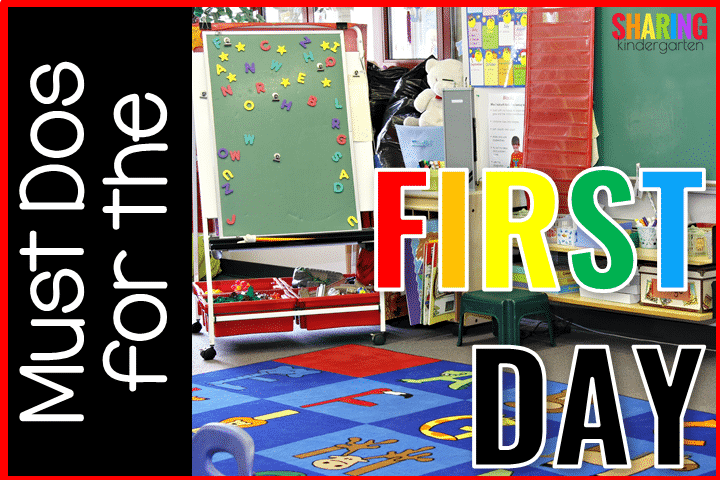
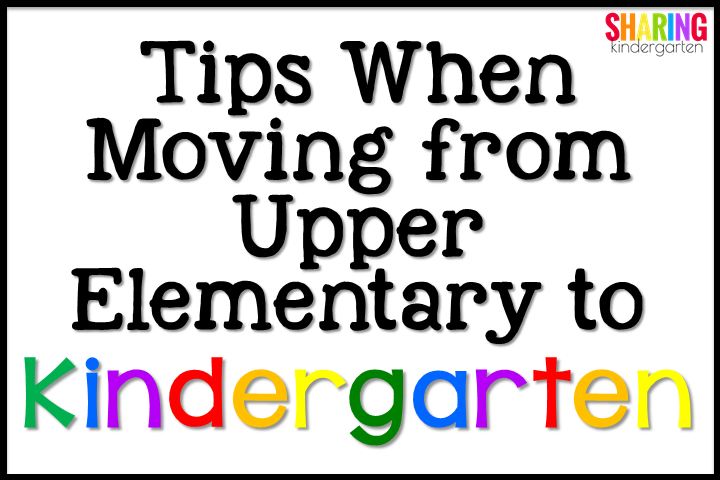
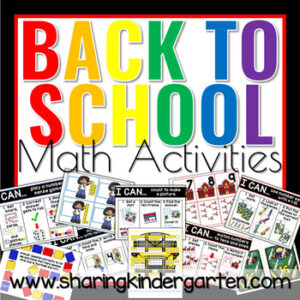
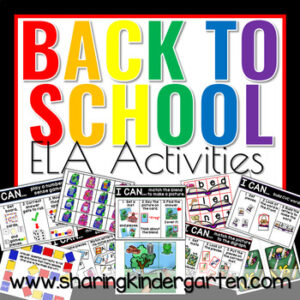
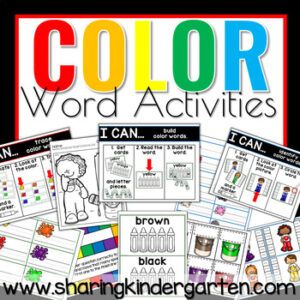

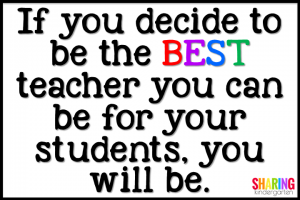

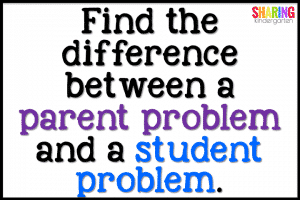

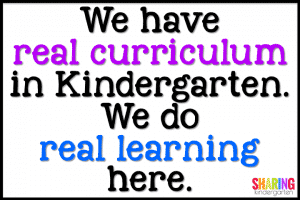
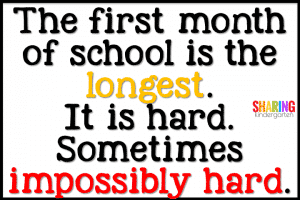
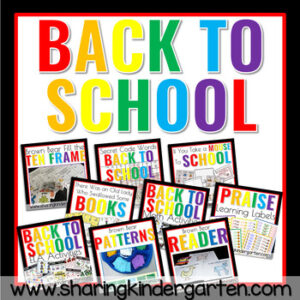
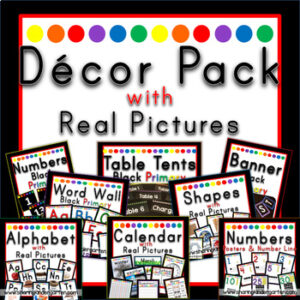
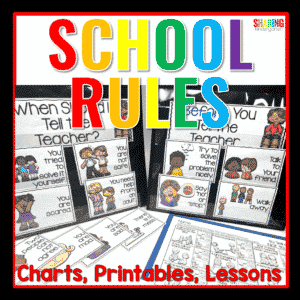

I really appreciate this blog. I’m 2nd year teacher, going from 4th grade to 2nd. I was a little apprehensive with this new situation, but your reflection upon what to expect eased a lot of my concerns. Thank you!!!!
This is beautiful. I am a retired teacher of 28 years, 14 of which were in Kindergarten. During those years, I went up and down the grade ladder a few times and Kindeegarten was my favorite grade. All your tips were spot on. I would add one: be prepared to spend a lot of the first day explaining the bathroom. Most of the children have never been in a communal bathroom by themselves and REALLY need to know the rules.